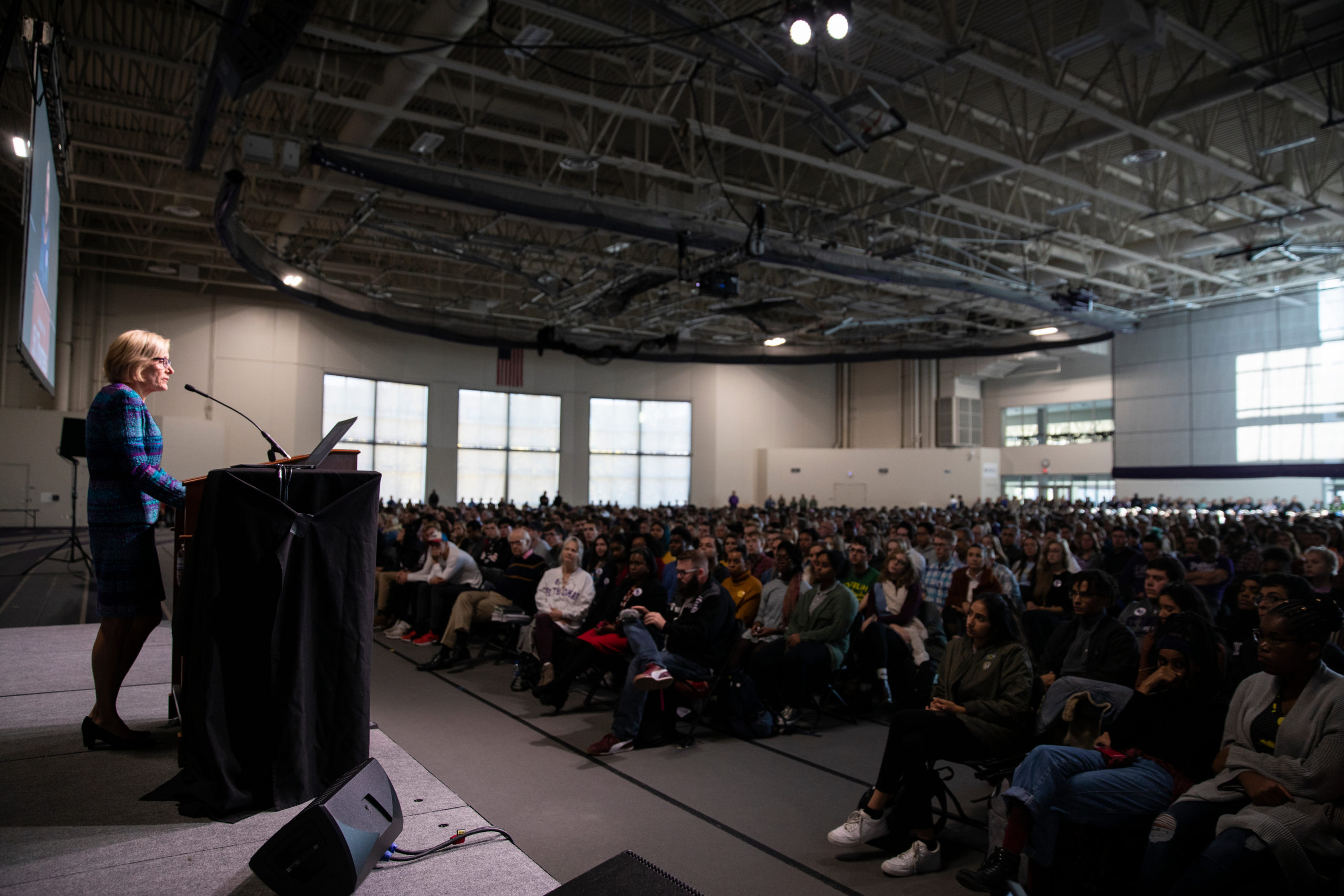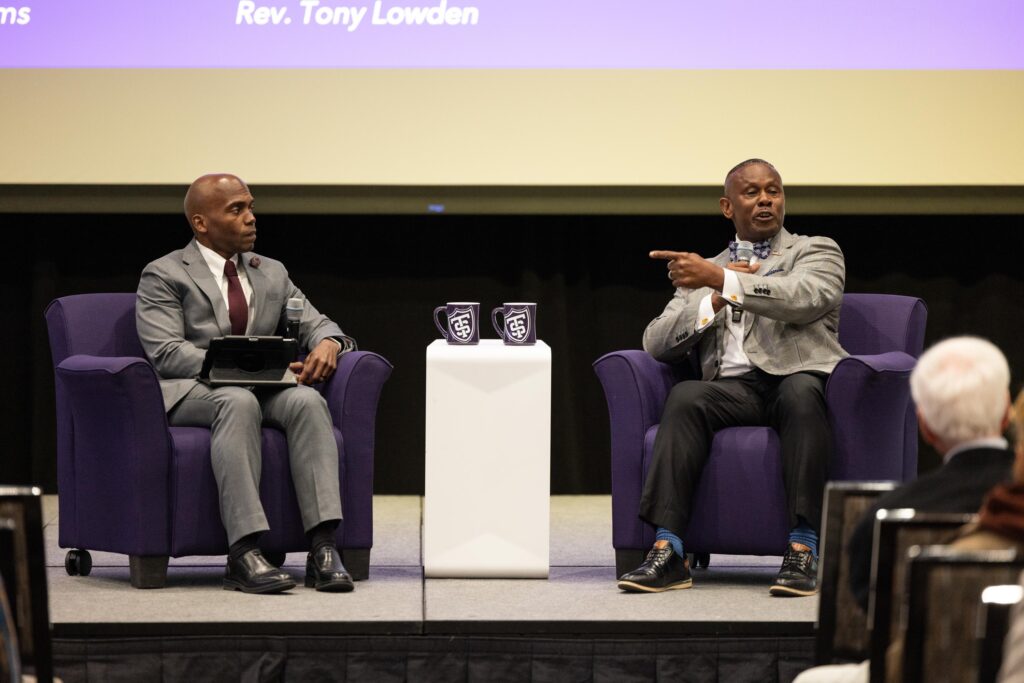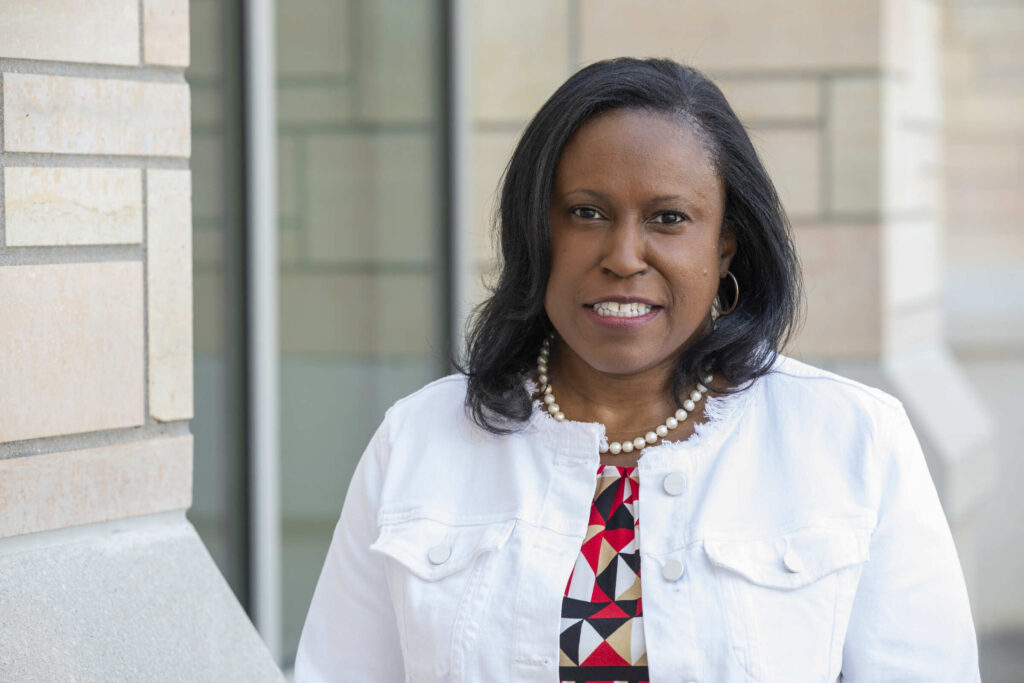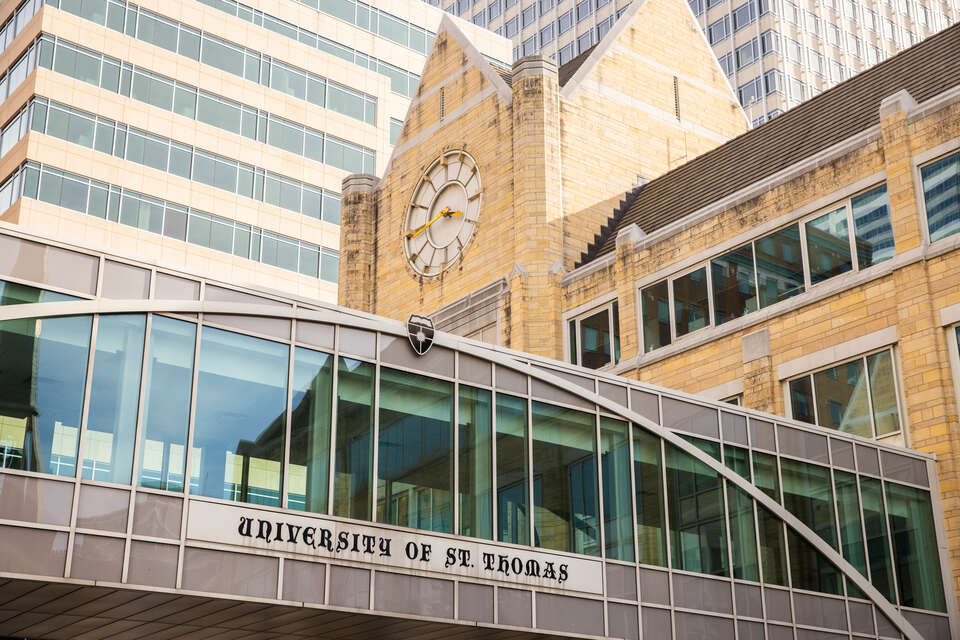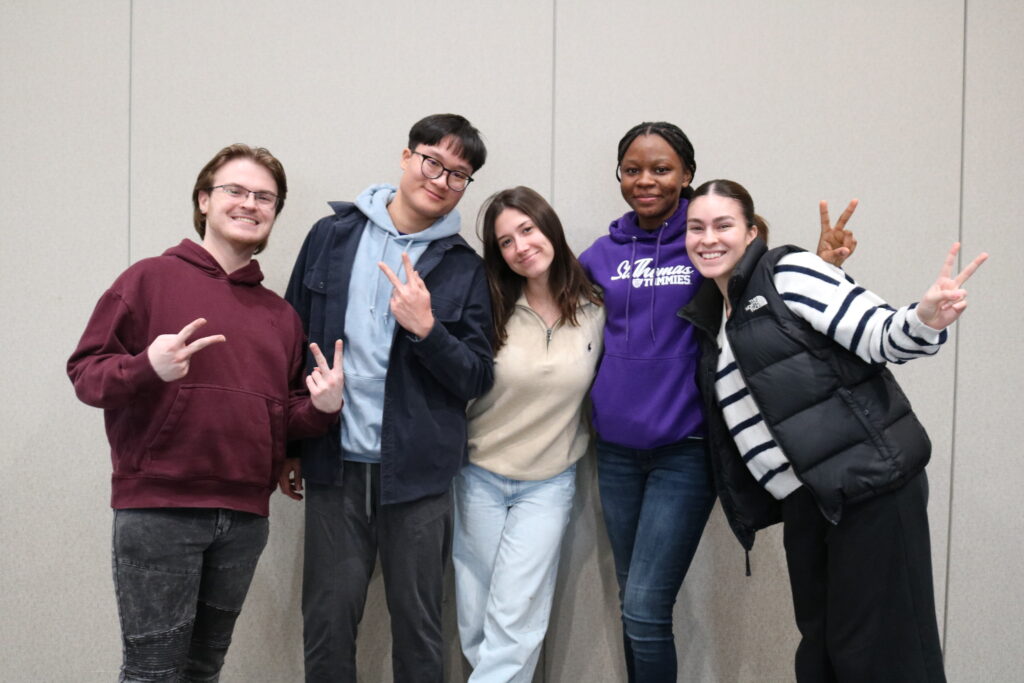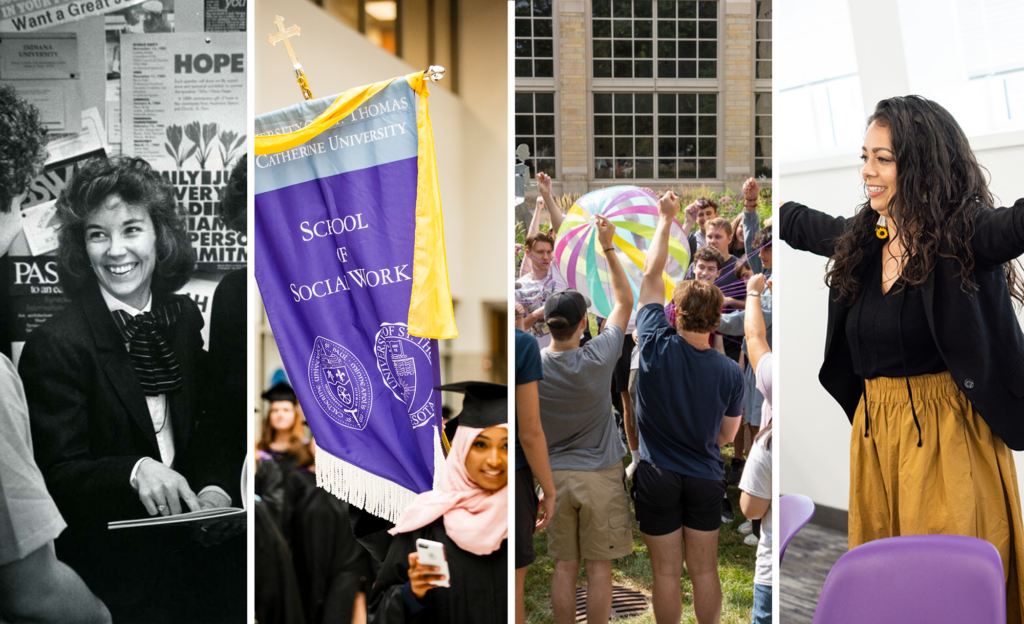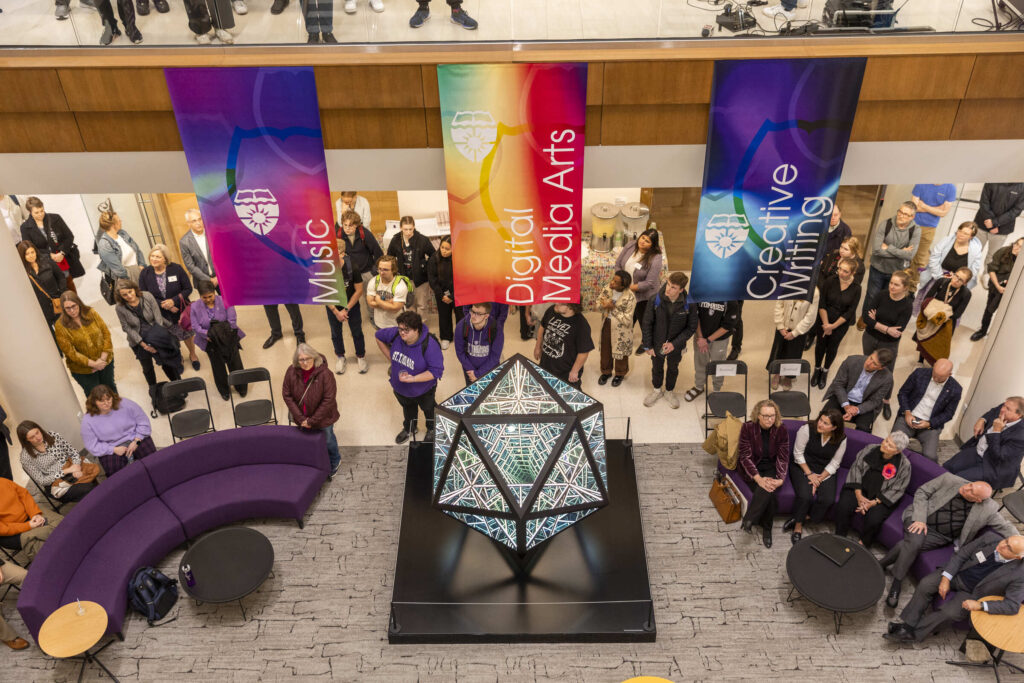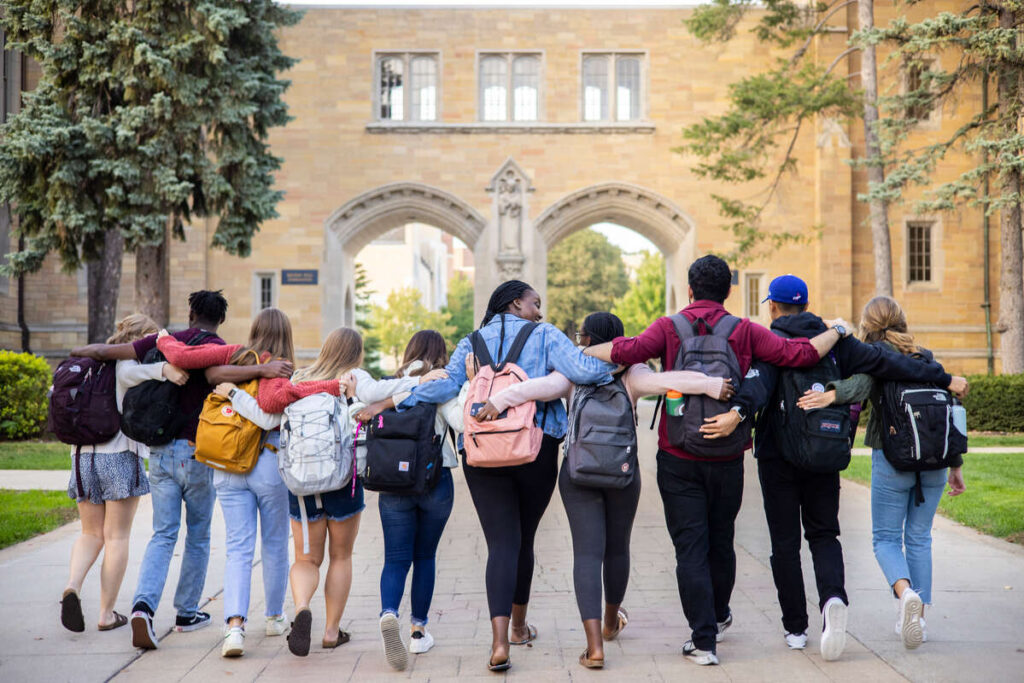St. Thomas gathered as a community Wednesday - more than 5,000 strong - signaling with their overwhelming presence that St. Thomas is ready for change.
The event represented a visible kickoff to the university’s commitment to combat racism throughout the St. Thomas community. Students, faculty, and staff, donning “Racism Stops With Me” pins, gathered at the field house in Anderson Athletic and Recreation Complex to take part.
“The students, the faculty and the staff of the University of St. Thomas want to say something. You want to say that you stand up against racism, and you stand up against hatred,” President Julie Sullivan said. “This is an historic moment for our campus. This is going to be a turning point. I pledge to you that as long as I am president … this will be my priority. But I can’t do it alone, and no one can do it alone. We, we have to do it together.”
Crucial questions
As the first step among many short- and long-term elements of the university’s action plan to combat racism, the event centered on three questions, which Sullivan posed at the outset: Where do we find ourselves, the context of the events that have taken place? What inspires us as members of the St. Thomas community to act? And what are we called to do?
Acknowledging that the hate crime recently committed at St. Thomas fits within a broader pattern of hate-filled events across the city, state and nation, Sullivan reinforced that now is, clearly, a time to act as a university community.
In doing so, St. Thomas can draw inspiration from many places, Sullivan reminded, starting with its mission and convictions, specifically the values of diversity, dignity, personal attention and gratitude. Along with those, the convictions of St. Thomas’ founder, Archbishop John Ireland, offer a powerful set of guiding principles.

Dale Allender, guest speaker, speaks to a large crowd at a meeting to discuss racist incidents and launch an action plan to combat racism in the Field House in the Anderson Athletic and Recreation Complex in St. Paul. Faculty, staff and students attended the event. Allender is a professor at California State University-Sacramento.
“As Black Empowerment Student Alliance president Amira Warren-Yearby so eloquently reminded us last week [at the sit-in protest], the University of St. Thomas was founded for first-generation college students, the children of immigrants, to make sure they fully realized their potential,” Sullivan said. “Archbishop Ireland spoke frequently and vehemently against racism. He said in 1890, 128 years ago: ‘There is but one solution of the problem, and it is to obliterate absolutely all color lines. Open up to the black as to the white man the political offices of this country. Making but one test, mental and moral fitness. Throw out the barriers … merely on account of their skin. … Meet your black brethren as your equal, at banquets and social gatherings. Give him, in fully meaning of the terms, equal privileges.' He has given us a gift, a charism, that we must remain committed to anti-racism, as he was in 1890. We must remain committed to it always and forever. It’s a part of the gift this community has been given.”
Sullivan highlighted several elements of the university’s action plan, which starts with a clear statement about St. Thomas’ values.
“We have to send it so clearly that those who do not embrace those values do not want to be here,” Sullivan said. “We have to send a clear message that when acts like this occur on our campus we will not tolerate it.”
Sullivan discussed the need for more well-defined and transparent reporting procedures, stronger support and counseling for victims of trauma, and the need to become a more diverse, inclusive and equitable university.
“This is hard work. We have to deepen our understanding of ourselves and of one another,” she said. “We have to ask serious questions, engage in serious discernment, ask questions such as, ‘Who am I? Where do I come from? Where am I? Where am I going?’ We have to understand our own and each other’s privilege and struggle. That’s hard work that requires us to be in communion with one another, to engage in authentic relationships with one another.”
“The greatest evil”
Associate Vice President for Diversity and Inclusion Artika Tyner directed praise and gratitude to the many students who have called such forceful and needed attention in the past two weeks to the university’s shortcomings.
“I bow to your moral courage and ability to organize and activate,” she said.
Tyner spoke of the need for education in the St. Thomas community, citing Septima Clark’s belief that “’the greatest evil in our country is not racism, but ignorance. I believe unconditionally in people’s ability to respond when they learn the truth,” Tyner quoted. “We know ignorance is a word about a knowledge gap, an opportunity gap. … Fixing that starts with learning, communicating and growing together.”
Dale Allender, PhD, of California State University, Sacramento, helped those gathered, begin that process on Wednesday, providing learning and perspective on the issue of racism from geopolitical, technological and neural biological contexts. Allender – after speaking with some 50 students on Tuesday – also relayed many of their concerns moving forward:
- The campus’ issues of colorblind racism;
- The potential loss of international students’ voices;
- The need to increase diversity;
- Reinforcing the idea this is a long-term, ongoing effort;
- The need for transparency;
- Representation for the transgender community;
- And the idea that oppression is a relevant topic in all academic disciplines.
“I want to close by offering you students a protocol to consider as you’re marching toward this very important moment,” Allander said, pointing to mindfulness, security, documentation, negotiation and dissemination as crucial to the ongoing process of evolving as a community to becoming more diverse, inclusive and equitable. “I don’t know any other campus that said, 'Let’s shut it all down and have a teach-in. We can have a sit-in as long as that gets us to a teach-in.’ Please continue to do that.”

Students, faculty and staff wore "RACISM STOPS WITH ME" pins during Wednesday's all-campus gathering.
The second part of the program included employee education and training for faculty and staff. During this portion of the event, Allender – along with St. Thomas School of Law Dean Rob Vischer – spoke, Sullivan adding closing remarks.
“We all have a story,” Vischer said. “And we all have a story of race – an emerging self-awareness of our race and how that shapes our interaction with the world. There is a bigger story of race, too. A story about race that shapes our national identity.”
Vischer’s presentation included a historical look at racial discrimination in the United States. Along with the national story of race and how the law has shaped reality for African-Americans in our country, he spoke about his personal story of race and how he has expanded and enriched it over the years.
“The story of race has to begin with slavery in America,” he said. “Where slaves were defined as three-fifths of a person in the U. S. Constitution. And, to our great shame, often the definition of slaves as something less than human was wrapped up in theological arguments, including Christian theological arguments.”
Starting with the roots of racial hierarchy in the late 1600s, Vischer covered a myriad of topics, including subjugation (“Jim Crow” segregation laws); constitutionally enshrined prejudice (Plessy v. Ferguson 1896); hope (Brown v. Board of Education U.S. 1954); a return to reality (What happened after Brown?); economic exclusion (home ownership laws); unequal burdens (the War on Drugs); lost lives (prison population explosion) and implicit bias and criminal justice.
“We have all come to St. Thomas with our own stories,” he said. “And those stories reflect the pain, the joy, the hope, the longing, the suffering. … Taking the time to learn each other’s stories is not a burden. It is not another hoop to jump through, especially when it comes to the stories of our students, faculty and staff of color – stories that are too often ignored or glossed over at predominantly white institutions. It is a privilege and blessing to know each other’s stories. Learning the stories that shape members of our community is the first step in being invited to participate in those stories and to write the next chapters together as one university community.”
Working toward social justice
While addressing faculty and staff, Allender delivered historic information and tools, including a definition of social justice and teaching tolerance with anti-bias training.
Allender talked about institutional racism in Minnesota, including the 1920 Duluth lynchings where three African-American circus workers – suspects in an assault case – were taken from the jail by an angry white mob, beaten and lynched. He also touched on Minneapolis Public Schools’ own history with racial segregation.
Allender walked attendees through the definition of social justice from the California Teachers Association, which read in part: Social justice means that we work actively to eradicate structural and institutional racism, sexism, classism, linguicism, ableism, ageism, heterosexism, gender bias, religious bias and xenophobia.
“The word eradicate also bothers folks because change – period – is challenging for folks sometimes,” Allender said. “But I want to assert that a lack of change in our current environment is a much, much more challenging way to live.”
Allender highlighted anti-bias training that could be adapted to any classroom, singling out four domains – identity, diversity, justice and action. Attendees had a short period of time talk to each other about which points in each domain were the most compelling to them and why.
“We want folks to take a stand, we want folks to act but we want them to do it with safety, clarity and commitment to a cause,” Allender said.
At the end of the event, Sullivan told the crowd, “I’ve learned so much, and I have so much more to learn. My commitment is that we will continue to have other opportunities to learn. I think it was very important that we started our day one with education and with learning.”
She closed with this message: “I firmly believe that if we don’t engage in this work, get on this journey with commitment and vigor and dedication, and stay on this journey – a journey that frankly will never end – we will not be a viable university in the future. We certainly won’t be a viable university in 20 years, but we may not be a viable university in 10 years. This is our viability as a community that has been here over 130 years that we hope will be here as a diverse, equitable and inclusive university for another 130 years.”
